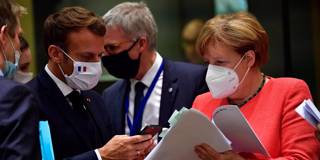No sooner had the European Union's pandemic recovery fund, dubbed Next Generation EU, been approved than it was hailed as Europe’s first move toward fiscal union. If anything, the way debt mutualization was snuck into the financing of the scheme will probably turn out to have been a mortal blow to a proper fiscal union.
ATHENS – During the worst clashes between the Greek and German governments amid the euro crisis, a German official attempted to dissuade me from insisting on debt relief for Greece with the argument that Germany may be rich, but a majority of its people are poor. On this last point, he was right.
A recent study has confirmed that half of Germany’s population owns just 1.5% of the country’s wealth, while the top 0.1% own 20%. And inequality is getting worse. During the last two decades, the real disposable income of the poorest 50% has been falling while that of the top 1% has been rising fast, along with house and share prices.
It is against this background of high and rising inequality that the mood of the German public must be understood, in particular popular resistance to the idea of a eurozone fiscal union.

ATHENS – During the worst clashes between the Greek and German governments amid the euro crisis, a German official attempted to dissuade me from insisting on debt relief for Greece with the argument that Germany may be rich, but a majority of its people are poor. On this last point, he was right.
A recent study has confirmed that half of Germany’s population owns just 1.5% of the country’s wealth, while the top 0.1% own 20%. And inequality is getting worse. During the last two decades, the real disposable income of the poorest 50% has been falling while that of the top 1% has been rising fast, along with house and share prices.
It is against this background of high and rising inequality that the mood of the German public must be understood, in particular popular resistance to the idea of a eurozone fiscal union.